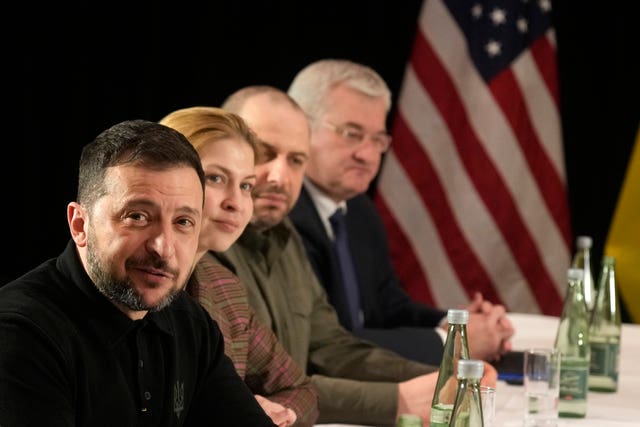West did ‘too little’ when Putin first invaded Ukraine, say Healey and Lammy
The Foreign and Defence Secretaries called on the UK and Europe to ‘do more’ to ‘share the burden’ of regional security

The West did “too little” when Russian President Vladimir Putin first invaded Ukraine in 2014, David Lammy and John Healey have suggested.
The Foreign and Defence Secretaries called on the UK and Europe to “do more” to “share the burden” of regional security in a joint article for the Daily Telegraph.
They also said that a “durable peace” would need a “continuing US commitment to its allies through Nato”, as world leaders prepared to meet again on Saturday at the Munich Security Conference.
The war in Ukraine has dominated the agenda at the gathering in Germany, in the week that US President Donald Trump said he has agreed with Mr Putin to start “negotiations” to end the conflict.
Meeting US vice president JD Vance on Friday, Ukrainian President Volodymyr Zelensky said he wants “security guarantees” ahead of peace talks.

Prime Minister Sir Keir Starmer told Mr Zelensky that Britain is committed to Ukraine being on an “irreversible path” to joining Nato, after the US appeared to rule out its membership.
Writing in the Daily Telegraph, Mr Healey and Mr Lammy said that for two decades the Russian leader has been “seeking to recreate the Russian empire and suffocate the countries around its borders”.
“Too often in the past, the West has let him,” they added. “We did too little in 2008 when he invaded Georgia, and in 2014 when he first went into Ukraine.”
Mr Trump’s administration has been calling for Nato members to spend 5% of GDP on defence, and Mr Lammy and Mr Healey said that “we have been clear that Europe and the UK must do more together to share the burden of our continent’s security”.
“Europe is united on the need to step up. We are – and we will,” they added.
Mr Trump said he had spoken to Mr Putin on Wednesday and agreed to “work together, very closely” to bring an end to the war as it nears its three-year anniversary.
The UK has been clear that talks about a peace deal must involve Ukraine, amid fears in western capitals of Washington and Moscow negotiating European security over the heads of leaders on the continent.
Mr Lammy and Mr Healey wrote in the Telegraph that “a durable peace must be based on new security arrangements: Europe doubling down to do more on our own continent’s security; a continuing, long-term US commitment to its allies through Nato; and British support to the US and allies in the Indo-Pacific.”
Both ministers have been in Germany for the security gathering, and Mr Lammy will take part in sessions on Europe’s geopolitical role and a plan for Ukraine on Saturday.
The UK will also co-host a roundtable discussion with Italy on migration, with representatives expected from the Netherlands, Poland, Bulgaria, Germany and others.
Mr Zelensky met US vice president JD Vance on Friday, and said he was “thankful” for US support but wanted guarantees on security,
“We want, really, we want peace very much. But we need real security guarantees,” he told broadcasters.
Mr Lammy discussed the conflict in a separate meeting with Mr Vance.
Speaking to broadcasters after the meeting he said “we are some way from a negotiated peace” and pledged the UK’s continued support for Ukraine.
He said he and the vice president “share the view that there has to be an enduring peace” and agreed that Ukraine would “have to be part of that negotiated deal”.
The Foreign Secretary also described his meeting with Mr Vance as “very good” and that they built on “the special relationship that the United States and the UK enjoy”.
He added: “Negotiations have not yet begun. These are talks, if you like, about talks, and we will continue to support Ukraine.”
Mr Vance sought to play down the prospect of a split between Washington and Westminster, saying at the start of the meeting the “special relationship between the United Kingdom and the United States will remain very strong”.
The US has suggested that Kyiv must accept it will have to give up some territory to the Kremlin, and that the country joining Nato was unrealistic.
A former Nato secretary general estimated that between 50,000 and 100,000 troops could be needed as part of a peacekeeping force in Ukraine, including Britons.
Speaking to the BBC’s Newsnight on Friday night, Anders Fogh Rasmussen said that Nato membership would be the “most efficient and […] the least expensive way to ensure the future security of Ukraine”.
On the US’ stance on Ukraine and Nato, he said: “We should create a coalition of the willing under the leadership of France and the UK, to provide security guarantees for Ukraine and deploy troops on Ukrainian soil.”
Earlier on Friday the Prime Minister spoke to Mr Zelensky and reiterated the UK’s position on a Nato spot for Ukraine, in an intervention that contrasts with Washington’s position that membership for Kyiv is not a realistic prospect.
In a readout of his conversation with Mr Zelensky, a Downing Street spokeswoman said: “The Prime Minister began by reiterating the UK’s concrete support for Ukraine, for as long as it’s needed.
“He was unequivocal that there could be no talks about Ukraine, without Ukraine.
“The Prime Minister reiterated the UK’s commitment to Ukraine being on an irreversible path to Nato, as agreed by allies at the Washington Summit last year.”
The leaders agreed it was an “important moment to demonstrate international unity and support for Ukraine” and “agreed to stay in close contact”, and that Kyiv needs further lethal aid and a sovereign future, the statement added.





